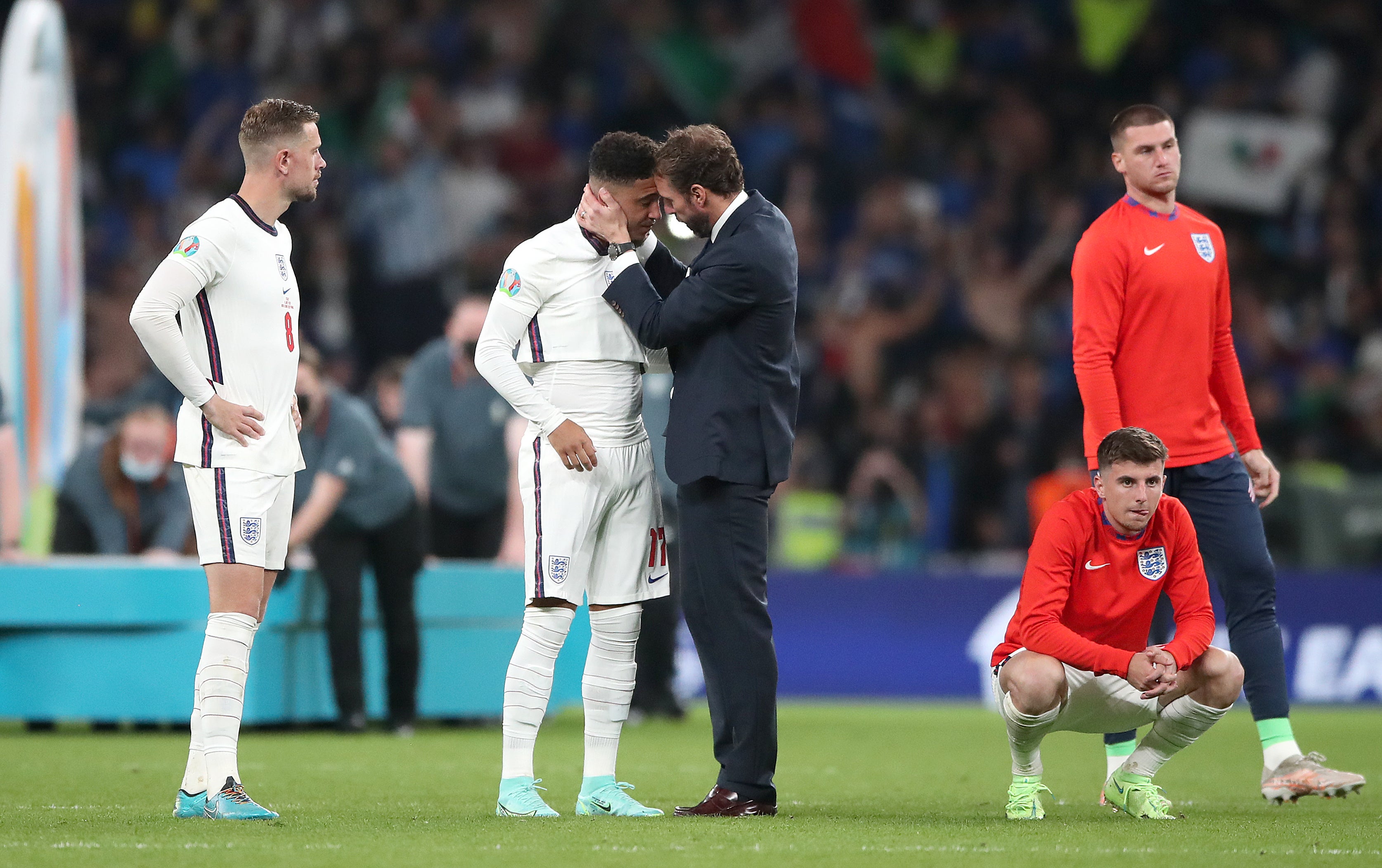The dream ended with a nightmare. Penalties. The best scriptwriters could hardly have constructed a more painful narrative. You can imagine the conversations in the writing room. Penalties? Too cheesy, surely? Gareth Southgate, the albatross of 1996 still hung round his neck, choosing the penalty-takers? Wouldn’t that be an absurd coincidence? Beating Germany to get to the final? The audience can’t be expected to believe that. Put Southgate, his squad, the fans, the country through all these traumas, and at Wembley, too? Well, football can be stranger than fiction. Many millions just watched that traumatic drama; it churned their guts and broke their hearts, and it was all too real.
Sobering up, there’s a huge amount for England to be proud about. The team, after all, isn’t usually seen in the final stages of any major international tournament. By now, most English football fans would be neutrals, deciding whether they’d prefer, say, France or Spain to prevail – fine viewing, but hardly the same as seeing Harry Kane and company on the pitch. This time, the ecstasy and the agony lasted until the last kick of the tournament.
On the night, Italy recovered from their early shock – unprecedented in Euros history – and England were fortunate to have made it to extra time and then to penalties. There’s no shame in England losing to such a team and in such a way, cruel as it feels. It will not be long – indeed a year earlier than usual – before the World Cup comes around again. No one should be getting the sack. This squad is not finished writing this new chapter in history. It is something of a turning point.
Win or lose, England were always going to be winners in the “2020” Euros of 2021. Simply to reach the final of a major tournament for the first time since 1966 was victory enough, a genuine triumph of hope over experience. It is notable that England got so close to being the best at the very moment when expectations, beaten down by three decades of false dawns and missed penalties, were at last being recalibrated with reality. No longer was England a prisoner of history and victim of an unwarranted sense of entitlement about football – something that seemed to cling to the team long after the last World Cup win.
With the perspective of history it seems that that win flattered to deceive – an aberration rather than the norm. Since Bobby Moore held the Jules Rimet trophy aloft, a series of disappointments eroded our self-confidence. There were the dreaded clashes with Germany, punctuated by heroic failures and signal defeats against derided sides, the likes of Poland (1973), Norway (1981), Ireland (1988), Sweden (1992), Iceland (2016) and Croatia (2018). Yet the authorities have in recent times reacted, investing in and building a team that seems now to have escaped the gravitational pull of 1966.
As with the team, so the supporters gained some sense of perspective. There was a burst of passion and Southgatemania as the final approached, but remarkably few cars and homes were bedecked in the flag of St George and the various incarnations of the Three Lions badge. There was much less tempting of fate.
For a change – and a welcome one – the media was no longer, in this tournament, obsessed with the Second World War. There were no headlines about 1940, no “Achtung!” snarkiness, and no Italy-baiting with anything more offensive than the abomination of pizzas adorned with pineapple chunks. A few sour notes about the taking of the knee, some nonsense about the spirit of Brexit, bandwagoning, hypocritical politicians and some drunken fools were disappointments – but all increasingly obscured by the example of solidarity and comradeship on and off the field of play.
It is a pity that Scotland and Wales exited the competition too early, and that Northern Ireland didn’t quite make it. A great deal of the coverage has been Anglocentric, often a failing in the London-based media, but, for once it should be judged forgivable in such unusual circumstances.
England had its share of luck, good and bad, which is the way of the game. There was that soft penalty involving Raheem Sterling in the Denmark match, but also one in the final, denied to England when Giorgio Chiellini blatantly fouled Bukayo Saka. Yet the achievements of the last few years are down to the extraordinary hard work of the squad, support staff, (most) fans, and of course the leadership and intelligence of Gareth Southgate.
A rare talent in any branch of public life, Mr Southgate blends the qualities of the greatest of British managers – the gentlemanly, understated Sir Alf Ramsey and the determination and off-camera directness of Sir Alex Ferguson. As “England manager” he has not only been responsible for creating a young squad greater even than the sum of its talents, but also for managing England’s expectations and emotions. Quietly but firmly, he and his players have refused to be bullied by the nationalist mob on social media, and insisted on their right to express their support for racial justice, including the Black Lives Matter movement. They were not being divisive, but inclusive, setting a dignified example to others who hold far more powerful positions.
The excruciating defeat hurts, but there is a great upside too. Mr Southgate’s messages to the nation have balanced respect for tradition and for the multicultural present and future of the country. His team have given the English a little hope and heart after a grim few years, and gained the respect of many across these islands. We are perhaps a slightly more United Kingdom as a result.




Join our commenting forum
Join thought-provoking conversations, follow other Independent readers and see their replies
Comments